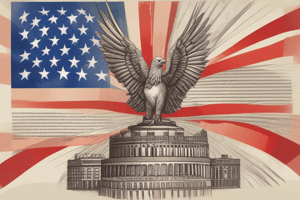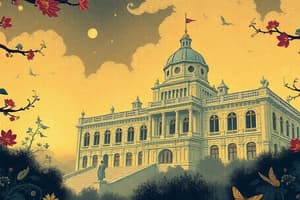Podcast
Questions and Answers
What is a common characteristic of a polity?
What is a common characteristic of a polity?
- A lack of a formal government
- Absence of a collective identity
- A defined structure with roles and responsibilities (correct)
- Disregard for any specific territory
What distinguishes a state from other types of polities?
What distinguishes a state from other types of polities?
- Sovereignty. (correct)
- A dependence on other territories.
- A shared culture.
- A common language.
Which of the following is an example of a supranational polity?
Which of the following is an example of a supranational polity?
- A family.
- The European Union. (correct)
- A local business.
- A single nation.
What is legitimacy in the context of a polity?
What is legitimacy in the context of a polity?
What is a nation-state?
What is a nation-state?
In a unitary state, where is power concentrated?
In a unitary state, where is power concentrated?
What do democratic systems emphasize?
What do democratic systems emphasize?
What is one potential challenge to polities?
What is one potential challenge to polities?
What does the term 'political culture' refer to?
What does the term 'political culture' refer to?
What does 'public policy' generally include?
What does 'public policy' generally include?
Flashcards
What is a Polity?
What is a Polity?
Any politically organized entity, such as states, nations, or organizations.
Organized structure in a Polity
Organized structure in a Polity
A defined structure with roles, responsibilities, and decision-making processes.
Governance in a Polity
Governance in a Polity
A system involving a government, council, or other authority.
Collective Identity
Collective Identity
Signup and view all the flashcards
Legitimacy
Legitimacy
Signup and view all the flashcards
Authority
Authority
Signup and view all the flashcards
Unitary states
Unitary states
Signup and view all the flashcards
Federal states
Federal states
Signup and view all the flashcards
Democratic systems
Democratic systems
Signup and view all the flashcards
Political Culture
Political Culture
Signup and view all the flashcards
Study Notes
- A polity is any entity that is politically organized.
- Examples are states, nations, corporate bodies, organizations, and other groups.
- The term refers to a specific type of political structure or organization.
Key Characteristics
- A polity has a defined structure with roles, responsibilities, and decision-making processes
- Governance involves a government, council, or other authority.
- Members or participants often share a sense of collective identity, culture, or purpose.
- A polity may be associated with a specific territory or a defined group of members.
- It exercises some form of political power or influence over its members or within its territory.
State as a Polity
- A state is a specific type of polity with defined territory, a permanent population, a government, and the capacity to enter into relations with other states.
- Sovereignty distinguishes a state from other polities.
- States possess a monopoly on the legitimate use of force within their territory.
Nation as a Polity
- A nation is a group of people who share a common identity, culture, language, or history.
- Nations often aspire to form their own state or to achieve some form of political autonomy.
- A nation-state is a state in which the majority of the population shares a common national identity.
Supranational Polities
- Supranational polities are political entities that extend beyond the borders of a single state.
- They involve the pooling of sovereignty by member states to achieve common goals.
- Examples are the European Union, the African Union, and international organizations like the United Nations.
Corporate Bodies as Polities
- Corporate bodies and organizations can also be considered polities.
- They have internal governance structures, rules, and decision-making processes.
- They exercise political power within their sphere of operation, such as influencing policy or advocating for certain causes.
Evolution of Polities
- Polities have evolved over time from simple tribal structures to complex nation-states and supranational organizations.
- Factors such as technology, economic development, and social change have influenced the evolution of polities.
- Globalization has led to the emergence of new types of polities, such as transnational networks and global governance initiatives.
Legitimacy and Authority
- Legitimacy is the belief that a polity has the right to exercise power and authority.
- Authority is the actual exercise of power by a polity.
- Polities derive legitimacy from various sources, such as tradition, charisma, or legal-rational principles.
Typologies of Polities
- Unitary states concentrate power in a central government.
- Federal states divide power between a central government and regional governments.
- Confederations are associations of independent states that delegate limited powers to a central government.
Political Systems within Polities
- Democratic systems emphasize citizen participation, free and fair elections, and protection of civil liberties.
- Authoritarian systems concentrate power in a single person or small group, with limited political freedom.
- Hybrid systems combine elements of both democratic and authoritarian rule.
Challenges to Polities
- Internal conflicts, such as civil wars or ethnic tensions, can threaten the stability of polities.
- External pressures, such as foreign intervention or economic competition, can also pose challenges.
- Globalization and transnational issues like climate change and terrorism require polities to cooperate and adapt.
Political Culture
- Shared values, beliefs, and attitudes towards politics within a polity
- Influences political behavior, institutions, and policy-making
- Can vary significantly across different polities
Public Policy
- Actions taken by a polity to address problems or achieve goals
- Includes laws, regulations, programs, and other interventions
- Shaped by political ideologies, interests, and institutions
Representation
- How citizens' views and interests are represented in political decision-making
- Can take various forms, such as elections, interest groups, and public opinion
- Crucial for ensuring accountability and responsiveness of polities
Political Economy
- Interaction between political and economic systems within a polity
- Shapes distribution of wealth, regulation of markets, and social welfare policies
- Influenced by factors such as globalization, technology, and inequality
Security
- Protection of a polity from internal and external threats
- Involves military, intelligence, law enforcement, and other security agencies
- Central function of many polities, particularly states
Justice
- Upholding of laws and ensuring fairness in the legal system
- Includes courts, prisons, and other institutions of justice
- Essential for maintaining social order and protecting individual rights
Welfare
- Provision of basic needs and social support to citizens
- Includes healthcare, education, housing, and social security
- Varies significantly across different polities, depending on their political ideologies and economic resources
Environment
- Management and conservation of natural resources and ecosystems
- Addressing environmental challenges such as climate change, pollution, and deforestation
- Increasingly important for polities to ensure long-term sustainability
Education
- Provision of knowledge, skills, and values to citizens
- Includes schools, universities, and other educational institutions
- Crucial for economic development, social progress, and political participation
Health
- Ensuring access to healthcare and promoting healthy lifestyles
- Includes hospitals, clinics, and public health programs
- Essential for the well-being and productivity of citizens
Infrastructure
- Physical and organizational structures that support a polity's economy and society
- Includes transportation, communication, energy, and water systems
- Vital for economic growth, trade, and social connectivity
Culture and Identity
- Promotion and preservation of a polity's cultural heritage and identity
- Includes arts, media, sports, and other cultural activities
- Important for fostering social cohesion and national pride
Innovation
- Encouraging creativity, research, and development to drive economic growth and social progress
- Includes science, technology, engineering, and mathematics (STEM) fields
- Can lead to new products, services, and industries
Global Governance
- Cooperation and coordination among polities to address global challenges
- Includes international organizations, treaties, and norms
- Increasingly important in an interconnected world
Comparative Politics
- Study of different polities and political systems around the world
- Involves analyzing their institutions, cultures, and behaviors
- Helps to understand the diversity and complexity of political life
Political Theory
- Exploration of fundamental concepts and ideas about politics
- Includes justice, democracy, power, and legitimacy
- Provides frameworks for understanding and evaluating political systems
Political Economy (Revisited)
- Focuses on the interplay between politics and economics, analyzing how political factors influence economic outcomes and vice versa
- Examines issues such as inequality, trade, finance, and development
- Provides insights into the relationship between state and market
Public Administration
- Implementation of public policies and management of government agencies
- Involves planning, organizing, staffing, and controlling public resources
- Essential for effective governance and service delivery
International Relations
- Study of interactions between states and other actors in the international system
- Includes diplomacy, war, trade, and foreign policy
- Examines issues such as peace, security, and globalization
Studying That Suits You
Use AI to generate personalized quizzes and flashcards to suit your learning preferences.




